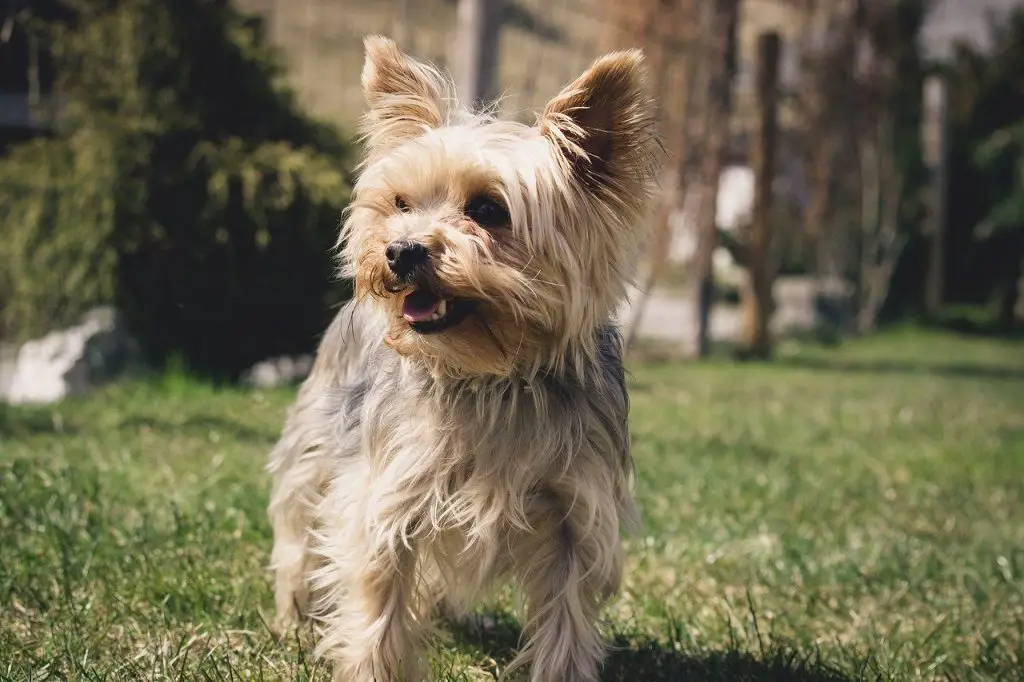Overview
Group: Toy Group
AKC Breed Popularity Rank: No. 10 of 195
Height: 7-8 inches
Weight: 7 lbs
Life Span: 11-15 years
Temperament: Affectionate; Exuberant; Very Eager to please
The Yorkshire Terrier has been lavished with so much praise by dog lovers for its very cute and adorable looks. But make no mistake! While the Yorkie may be the embodiment of cuteness overload, it is a true terrier, possessing the trademark courageousness, tenacity, and feistiness of the breed.
History
The Yorkshire Terrier was developed in Yorkshire and Lancashire counties in England during the mid-1800s. They were reportedly bred by Scottish weavers who migrated to England and brought their pet terriers from their native land of Scotland. The Yorkie is a genetic mix of now-extinct Scottish terriers, Skye Terrier, Dandie Dinmont, with a dash of Maltese thrown in.
But before they became pampered lapdogs of Victorian ladies, the Yorkie had working class beginnings. Because of their small size, they can squeeze through holes and nooks to catch rats. They also were used in coal mines in the same capacity.
The luck of the Yorkie changed with its recognition by the Kennel Club in England in 1886. Since then, the breed has become famous as a gorgeous pet for ladies and children.
There are some famous Yorkies in history. Sylvia, the smallest dog in recorded history, was a Yorkshire Terrier from Blackburn, England. Equally famous was Smoky, who accompanied his owner William Wayne of Cleveland, Ohio and his fellow soldiers during World War II. On the literary front, Toto – Dorothy’s dog in The Wizard of Oz – was a Yorkie.
General Appearance
The Yorkie is a long-haired dog, with its blue and tan coat falling straight down, like a silky waterfall, on either side of its body. Its long facial hair is usually tied at the top or back of its head with a ribbon. The Yorkie’s small, dark eyes express intelligence and alertness. It has small and erect V-shaped ears. The tail is darker in color than the rest of its body and is usually docked to medium length.
Dog owners who don’t want their Yorkies for show clip its long coat short every few months.
The Yorkie, in general, is a happy, active, and spirited little dog, with a tendency for bossiness.
Nutrition
Because Yorkies have a tendency to become hypoglycemic, they should be given three full meals of high quality dog food at regular intervals throughout the day for adults and four times a day for puppies.
It is also important that you include kibble-size dog food in their diet. Because they are prone to dental diseases, dry kibble helps in maintaining the dog’s dental health by scouring away plaque from the teeth while the Yorkie is eating.
In addition, Yorkies can become overweight if you overdo it with the treats. Early on, train your dog to eat healthier alternatives, like bits of cheese, carrots, canned pumpkin, and green beans.
Grooming
The texture of Yorkie fur is very similar to human hair, so groom your dog as regularly as you would your own hair. For dogs with long coats, daily brushing is needed to maintain its silky shine as well as stimulate the release of natural skin oils to prevent skin irritation. Always trim the hair on the upper part of the head or tie it in a topknot so as to prevent eye irritation. Make it part of your grooming schedule to check your dog’s ears for possible signs of infection.
Exercise
Make sure that you exercise your Yorkie twice a day. Take them out with you on brisk walks or jogs. Indulge them in games of fetch by tossing their favorite toys and have them bring it back to you. You may also consider having your Yorkie join in dog sports, such as obedience and agility.
Training
It is important to start training your Yorkie as early as seven to eight weeks old. Because of their feistiness and short attention span at this age, teaching basic commands may be quite challenging. However, because Yorkies are intelligent and eager to please, make sure that you are consistent, patient in repeating expected actions upon command, and providing positive or negative reinforcement when necessary. By doing so, you will not end up with a demanding, bossy, snappy, and yappy dog on your hands.
Because of their diminutive size, avoid roughhousing your Yorkie as this may lead to undesirable defensive behaviors.
Health
While generally healthy, Yorkies are still prone to a few medical conditions. For one, they have sensitive stomachs. If your dog finds a particular food disagreeable, remove it immediately from their diet. Introduce new foods gradually. They are also prone to eye problems, so again, keep their fur out of their eyes by trimming the excess or tying it in a topknot. Yorkies are also prone to a luxating patella, or dislocated kneecap. To prevent this, you should limit the jumping height of your dog, especially when they are still puppies.
Costs
If you are thinking of purchasing a Yorkie puppy, the average price is $600-$800, with show line pups going as high as $5,000 or more. Because of its potential health issues, health care costs may jump to an average of $9,800, making the Yorkie one of the more expensive breeds to own.
However, if you believe, as many Yorkie lovers do, that cost is not a factor, you cannot find a more adorable and lovable pet. Just make sure that you don’t overdo it with the pampering and let your dog indulge in its feisty, exuberant terrier nature.
SOURCES:
1) Yorkshire Terrier https://www.akc.org/dog-breeds/yorkshire-terrier/
2) Foods My Yorkie Can Eat https://www.petcarerx.com/article/foods-my-yorkie-can-eat/294
3) How to Train a Yorkie https://canna-pet.com/how-to-train-a-yorkie/
4) Yorkshire Terrier Puppies for Sale https://www.nextdaypets.com/Yorkshire-Terrier-Yorkie.htm
5) Most Expensive Dog Breeds https://www.gobankingrates.com/saving-money/pets/most-expensive-dog-breeds


